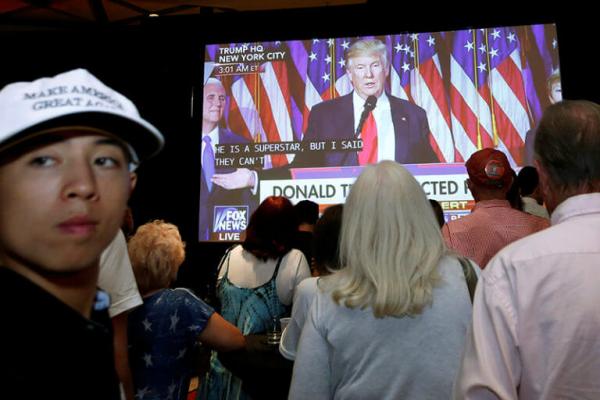In the aftermath of this presidential election, I can’t help but see striking similarities between what happened inside the religious cult of my childhood and what played out for us, in the political cult of personality.
Here was the larger-than-life leader drawing followers to himself, despite the facts of his poor character, lack of experience, and even despite the fact that media, pundits, and pollsters claimed he wouldn’t — couldn’t — win.
But no amount of scolding, derision, or facts from outsiders could sway his followers. Indeed, this perceived persecution by the “liberal media” only reinforced their worldview.
The same thing happened when I was growing up inside a religious cult.
The facts didn’t matter. What we believed mattered, and our beliefs were what made the facts the facts. Doctrinally, our beliefs closely mirrored present-day Southern Baptists, but practically speaking, the facts were whatever our leader said they were, and no amount of scolding, derision, or “facts” from outsiders could sway us. Indeed, we perceived such chiding as persecution, and it only reinforced our worldview.
After all, we had God. And that fact trumped everything.
So, when Donald Trump won the election — much to the consternation of many media types — everyone scrambled to figure out just how this had happened. I know how this happened. It happened because this election wasn’t about facts. It was about a religious worldview.
Prominent evangelical leader Franklin Graham was quick to explain. “None of them understand the God factor,” he wrote on Facebook, referring to the “secular media.” And on Twitter: “I believe God’s hand intervened Tuesday night to stop the godless, atheistic progressive agenda from taking control #Godfactor. ” According to Graham, the most important factor to a majority of American voters was God, and when Christians went to the polls, “God showed up.”
Graham’s explanation isn’t the whole story. Yes, pollsters and prognosticators drastically underestimated Trump voters. However, it’s not because they didn’t understand how important the “God factor” was — after all, it wasn’t too long ago that evangelical voters also lifted George W. Bush to victory. The reason the media didn’t understand the “God factor” was because they didn’t understand the “fact factor” — which is to say, how little the facts mattered to white, evangelical voters.
The big names in media didn’t see a Trump victory coming because it just never occurred to them that the facts wouldn’t matter. They kept hammering away at The Facts, and presenting The Facts, and gawking with thinly disguised contempt at anyone who refused to see The Facts. Hillary didn’t get it either. Every time she told debate viewers to “check the facts,” she probably lost voters. For better or worse, this is the America we’re living in now.
In many ways, this election wasn’t even about Donald Trump. It was about which candidate confirmed and validated the religious worldview of white, evangelical Christians. Trump simply figured that out, and then confirmed and validated this worldview until 81 percent of white, evangelical voters cast their ballot for him.
But what about Christians like me who didn’t vote for Trump?
Well, this past week has felt akin to betrayal. I admit to my own shock and sense of abandonment when I realized how many of my fellow Christians voted for him. I wondered how they could place their faith in someone whose life so blatantly disregards the way of Jesus. How could they elect a president who brags about grabbing women’s genitals?
But perhaps I am forgetting the lessons I learned inside the cult. I’m forgetting that this election wasn’t about whether Trump was an honest Christian of upstanding moral character. It was about — in Franklin Graham’s words — stopping the “godless, atheistic progressive agenda.”
Evangelicals were able to look past Trump’s poor character because there was a higher purpose to be accomplished. They were able to look past Trump (and even the extremist, alt-right groups that supported him) because they know all the Bible stories where God uses sinful men to do his will. King David: adulterer and murderer. The Apostle Paul: persecutor of the church. Comparatively speaking, I guess Donald Trump seems rather tame?
And let’s not forget that once you’re deeply ensconced in this religious worldview, there’s a heavy price to be paid for breaking rank. For many of these believers, the Republican vote is the Christian vote. So, once Donald Trump became the Republican candidate, a vote for Hillary was a vote against God’s anointed leader. No Christian wants to be guilty of that. No Christian wants to be cast outside the camp.
But for all the lessons I learned in a cult, perhaps the most important one was how quickly a leader can fall from grace. Even the greatest, most charismatic leader must reap what he sows. Even the slickest, trickiest leader will be found out by his sin. What happens when Trump fails to deliver on all his grandiose promises? Perhaps the spell will be broken. What happens when he continues to behave like, well, Trump? Perhaps he’ll be caught in his own Watergate.
The truth is that there’s not a whole lot of kindness going on inside the evangelical cult mentality. Hypervigilance, condemnation, and fear rule the day. Honestly, it’s pretty exhausting always being on the lookout for the godless, atheistic agenda. You never know when it might pop out at you. You never know when another “nasty woman” might show up with facts.
Sure, it can feel rather lonely out here. But then I remember that Jesus was never part of the popular religious crowd either. Jesus is still out here with the refugees, the downtrodden, and the brokenhearted.
God is still love. And if that’s a fact, then love is the “God factor” that trumps even Trump.
Got something to say about what you're reading? We value your feedback!
